0 Volumes
No volumes are associated with this topic
Right Angle Club, 2018
New topic 2018-02-03 03:54:38 description
Bob Reinecke
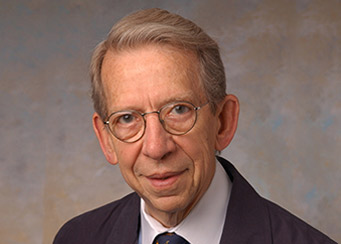
|
| Robert D. Reinecke, MD |
Bob Reinecke died this year, aged 88. He had been my doctor, and I had been his. Born in Kansas, he had originally been a an oculist, running a jewelry shop, but grew dissatisfied and went to optometry school, which dissatisfied him even more, so he went to medical school in Chicago and eventually became an ophthalmologist, rising to chief physician of Wills Eye Hospital, and ultimately to be President of the American College of Ophthalmology. When he returned from the induction ceremony in New Orleans, I asked him how many people were in the audience and was told there were three thousand of them. The source of this adulation was the invention of computerized eye surgery for cross-eyes, as well as the connection between albinism and strabismus. There is little doubt he invented the subjects, as well as the accepted treatment of them.
As those who remember Dorothy and the "Wizard of Oz", Kansas is famous for wind, cyclones, and tornadoes, and Bob grew up absolutely hating windstorms. So one of the hidden motivations for moving around the country was to avoid the wind. Someone told him the peculiar fact that Albany, New York has the least wind of anywhere, so he moved there. I have no idea why there is so little wind in Albany, but it also has a remarkable number of fish. His farm outside Albany would commonly produce fifty trout a day, which he would unhook and throwback. That certainly made him eligible for all manner of fishing championships while he was otherwise occupied with investigating cross-eyes and nystagmus, Albinos and what-not.
When I got to him, he had serum cholesterol of more than four hundred, and a history that almost no one in his family lived to be fifty. He was covered with lumps which we called cholesteatomas. I suggested he exercise more, and shortly thereafter statin drugs came along. It was a great pleasure to watch the lumps disappear, but he never quit exercise. He regularly ran fifty miles on weekends and five miles during the week; I'm not sure if he won the Boston Marathon, but it certainly was a possibility. As mentioned, he lived to be 88.
On a speaking trip to India, he learned how to sew shirts, and thereafter sewed his own. He was an accomplished pianist, and for years was a soloist bass singer, wood carver and carpenter. The University of Kansas has two professional chairs named for him and one large building. Wills Eye and the Pennsylvania Hospitals are two blocks apart, and he represented Ophthalmology for twenty-five years in the House of Delegates of the AMA, while I represented Pennsylvania, and so we frequently walked together the five blocks to the Union League for lunch. Medical politics played a prominent role in these walks, but we found ourselves on opposite sides of the socialized medicine controversy. Eventually, he became a leading advocate of the single-payer approach, while I was 180 degrees away, leading the troops into Health Savings Accounts. In many ways, the epochal moment was a debate at Haverford College, with Harris Wofford running for Senator, Bob coaching him one way, and I the opposite. Wofford won the election, but Wofford said I won the debate. And as you notice, the AMA betrayed us both. Subsequent to that election, we both stuck with our friends in Washington respectively, but never once wavered in our friendship.
We will miss him.
Army War College in Carlisle
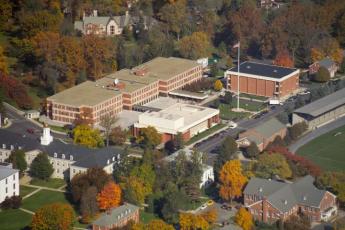
|
| U.S. Army War College |
Our program chairman, Carter Broach, once attended the Army War College, so he was in a position to invite Colonel Tom O'Steen to the Right Angle Club to tell us what the College was all about. Although there may have been times in the past when the Army welcomed secrecy surrounding its College, in recent years it has become concerned that the military may be isolating itself too much from the people it serves and defends. So Col. O'Steen was told he was welcome to talk to us. In fact, giving one speech to the public is a requirement for graduation. The history goes back to 1757, includes Ben Franklin, and also includes some interesting anecdotes which might not have been expected of a War College.
Like all land in Pennsylvania, this plot within what is now the town of Carlisle, PA, once belonged to William Penn. Nobody else owned it until 1757 when Ben Franklin was sent to negotiate its transfer from the Indians. William Penn had been careful to buy land from the Indians, even though he also formally owned it as part of a deed from Charles II of England. Other land proprietors had not been so scrupulous, often complaining of the Indian massacres which resulted, although seldom adopting Penn's rather inexpensive method of avoidance.
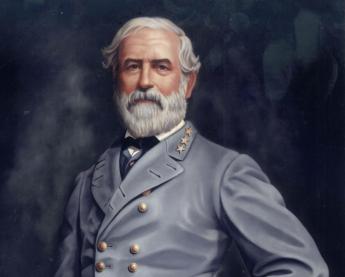
|
| Robert E. Lee |
During the Revolutionary War, Carlisle was a comfortable distance from the British Navy, and served as a backwoods artillery arsenal along the Appalachian Mountains, much as the Ho Chi Minh Trail served our enemy in the Vietnam conflict, along with an Asian mountain range. From 1790 to 1860, Carlisle served as a cavalry post, and then General Robert E. Lee invaded Pennsylvania up one side of a mountain ridge, with General Meade bringing up the Union forces from Washington DC on the other side of the ridge. The two valleys come together at Carlisle, so that spot had long been recognized as commanding both. Lee only got as far as Gettysburg before Meade caught up with him, but General Ewell's Corps took Carlisle as an advance guard. Confederate cavalry General JEB Stuart took Carlisle without sustaining a fight. Meanwhile, General Lee was fretting that Stuart was supposed to be his eyes and ears, keeping him informed of Union opposition, and it is possible that Stuart's Carlisle diversion thus had some influence on the outcome of the Battle of Gettysburg.

|
| Earl of Carlisle |
By 1879 there remained little purpose in a Carlisle military post, so it was turned into an Indian Industrial School, a couple of miles East of Dickinson College. After the Civil War, the nation lost its taste for exterminating Indians and turned to the idea of removing Indian boys from their families in order to assimilate them to white customs. Unfortunately, this did not work very well, and in fact, nothing worked very well. There are over 340 Indian languages from Eskimo to Aztec, but there is no record of any tribe allowing itself to be assimilated. The Spanish tried slavery, the French tried intermarriage, and the Americans tried persuasion and reasonableness. Eventually, we gave up and isolated them on reservations, but not before a wide-spread attempt was made to isolate Indian boys in boarding schools, hoping to remove them from tribal influences. That didn't work, either, but it was being attempted at Carlisle in the late 19th century. Interestingly, Carlisle is named after the family of the Earl of Carlisle, who was sent by Lord North after the disastrous British defeat at Saratoga, in order to see if the colonists might still be interested in Taxation with Representation. We weren't, so the Revolutionary War dragged on for another six years. Somehow, when war fever captures countries, small victories seems to close minds to what they had been originally fighting over. If the War College has time for another lesson, I suggest they add that one to their curriculum.
Before going back to the origins of the Army War College, we should salute the momentous football game of 1912, between the West Point cadets who included Dwight Eisenhower, and the Carlisle Indian School team which included Jim Thorpe. Thorpe was a member of an Oklahoma Indian tribe, but in many ways has been regarded as the best all-around American athlete in history. Eisenhower was pretty good, too, but Carlisle won the game.
 To raise and support Armies, but no Appropriation of Money to that Use shall be for a longer Term than two Years; To provide and maintain a Navy; 
|
| Constitution, Article 1, section 8 |
Several members of the Right Angle audience expressed the view that the Armed Services have more to fear from know-it-all university professors who feel they monopolize the field of strategic thinking than from Congress, which tends to have a goodly number of combat veterans in its ranks. It's all very well to repeat the mantra that the armed forces must respect civilian control, and then it's also just as well to remember that most coups are military coups in other countries. But whatever the future brings, these young Lt. Colonels will be the ones we must count on when the going gets really tough.
Revolutionary Features of Big Data
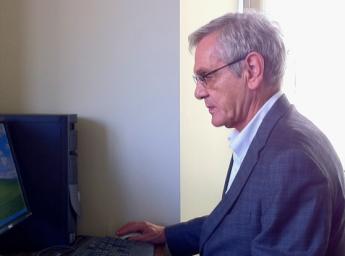
|
| Professor Kenneth Burdett |
The Right Angle Club, now in new quarters in the Pyramid Club, was recently visited by Professor Kenneth Burdett of the Universities of Pennsylvania and Cornell. A charming fellow with a Scottish burr (he mentioned being born in England), the professor told of a new twist to economics, which mostly employs familiar data in unfamiliar ways. Many concepts central to macroeconomics actually become less informative as net values or ratios of other expressions, losing useful information in the name of abbreviated elegance. "Unemployment" was offered as a handy illustration.
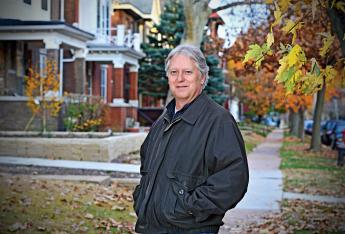
|
| Mark Rank |
We tend to think of 230,000 new jobs this month as a hard fact, whereas employment might be more precisely described as a set of several million people switching jobs each month, offsetting several million others who gain new jobs, along with almost as many who simply decide to leave the workforce and retire. We always sort of knew unemployment was a combination of gainers and losers, but few of us recognized that net turnover affected far larger volumes of people going opposite ways at slightly different rates. The reasons underlying a large flux, in other words, may be much more important than small net overall fluctuations. Or, far larger population upheavals may produce deceptively similar net results. We've been accustomed to judging smaller final ratios than to many-times larger underlying flows, or at least implying undue importance to a small subset of change. What usually happens is vastly larger numbers of people lose their jobs during a depression, but almost as many millions more re-enter the workforce, too, but at a lower wage level.
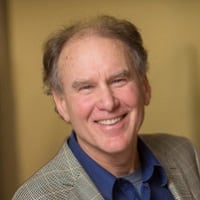
|
| Thomas A. Hirschl |
Curiously, a new book by Mark Rank of Washington University, and Thomas A. Hirschl of Cornell (!) called Chasing the American Dream: Understanding What Shapes our Fortunes has just appeared, saying much the same thing. Their approach is to develop a figure for the risk of being unemployed for a year in the next 5, 10, or 15; at the moment the answer for unmarried white persons sometime during the next fifteen years in the future, is 32 percent. That seems to be a much more scary projection than setting the present aggregate total unemployment at 4.6%. We'll have to wait 15 years to see which prediction really is more descriptive, or if it has the same consequences we immediately assign to it. But it would appear many assumptions are about to be set on their head, and the quality of our projections is about to shift dramatically. For example, Chairman Bernanke of the Federal Reserve placed great stock on wage inflation being "core" inflation, but these calculations suggest much more can be made of the data than that. Since somehow it is suggested the present recession has eight more years to run, current oversupply may require eight more years to run down; old data restated in this new way may have different implications for policy.
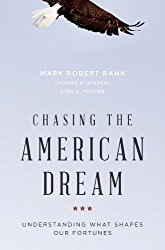
|
| Chasing the American Dream |
Right Angle members who lean both right and left seemed impressed and befuddled by a new view of an old topic, and that's probably a good thing. There seems no question of the validity of the approach, no question of significance, and little doubt of its ability to change attitudes. We look forward to many more such insights from the Dismal Science, of this nature. For instance, this professor of many students of the rentier class remarked at how repeatedly he had been struck by students able to afford red convertibles (and the Princeton tuition cost) were nevertheless willing to throw themselves into the scrum of Wall Street, to make even more money.
He regarded that as a strength of the American economy, in stark contrast to that in Europe, where the first sign of prosperity sent his old acquaintances straight to the pub, to relax a bit. In the British aristocracy, "entering trade" is a low-class thing to do, whereas sitting on the sidewalk sipping wine is the mark of really high class. The American version is reversed, but possibly that's a more useful misconception.
Admiral of the Ocean Blue
The Right Angle Club had a mystery guest the other Friday, except every person in the audience recognized mystery man at sight. The mystery may have had something to do with the Pyramid Club, which the Right Angle rents from a law firm whose leader was Ed Rendell, former Democratic Governor of Pennsylvania. Or it may have had nothing to do with that. Everybody was certainly familiar with the feud between the Guv and Joe Sestak, formerly an unsuccessful contestant for Senator Toomey's seat. All politicians are egotists, but grudge fight was how it was generally described. Joe had worked himself up to two terms as a congressman from Delaware County, and before that to Vice Admiral in the U.S. Navy, which also involves a dozen or so highly contested promotions and elections.
In politics, you never know who will catapult himself into becoming your boss or your opponent, or a supporter of someone else who does, so an elaborate facade of fake friendship may thinly conceal the bitterest of enemies. The pretense is generally maintained that all members of your own party are chums, and almost all members of the other party are bitter foes. It's much like the pretenses of Harvard and Yale alumni, except sometimes it's real enough. This rivalry is at its very worst among paid election workers (generally called consultants) when they aren't being described as lying, no-good skunks who always look to advance their services for some worse candidate. They operate knowing losers generally get fired immediately, tarred as scapegoats. As far as the dumb public voter is concerned, it's simply conventional for candidates to pretend to love all party members, hate all opponents, and maintain total secrecy of the truth from the press. So when you encounter a candidate who actually speaks his mind, it's a surprise. A surprise which generates still more enemies, because it exposes rival candidates as hypocrites without actually saying so.
As a consequence, party bosses usually follow the advice of Machiavelli, depending on brute force to keep their troops in line, insisting on the pretense of "team player" , while holding the candidate himself in line with the promise he won't win election should the party apparatus hold back on campaign funds and the obedient service of real "team players". Ideally, the candidate just reads nice speeches for the teleprompter, while the party boss really wins the election by fund-raising and patronage. In more extreme cases, the party boss even votes the way the boss tells him to, and the only acceptable excuse for "bolting the party line" is he might lose the next election if "the party" insists on an impossible mandate. Attempts are usually made to allow such conflicted votes to go one way in the House and the other way in the Senate. In close districts. Almost none of this is often feasible, so party bosses thrive in one-party districts. Since party power has been rather close in the past few national elections, circumstances encouraging bossism have weakened, with the paradoxical effect that the party often becomes desperate and applies brute force even more strongly, before it ultimately collapses. The memory of such "betrayals" can unexpectedly resurface, decades later. Since a military man is accustomed to giving orders to pliant team players, he becomes accustomed to giving orders, not taking them. And the Navy is somewhat worse than the Army, since sailing out to deep water usually puts the former captain in unchallengeable charge, reacting to unspoken traditions of that effect.
So, when Senator Schumer told Sestak to do something "or else", the response was not that of a team player. When legislation hung by one or two votes, it's not surprising that the Clintons, Rham Emanuel, Pelosi, Obama and other names you would recognize applied the whip in ungentle language. When Senator Specter was induced to commit to the unpardonable sin of switching from Republican to Democrat -- it was not unexpected for millions of campaign dollars to shift to Sestak's opponent, at the direction of his own headquarters. In listening to an hour of Sestak's speech without his identifying what office he was running for, I tried to surmise if he was pushing for anyone else, but the only favorable mention was young Kennedy, in the right circles a word synonymous with ruthlessness. If that's the ball game we are playing, Trump may have a better chance than I would have guessed. This time, it's probably going to be any name but Kennedy, Clinton or Bush.
Bob Gill, M.D.
Because just about all medical internships still begin on July 1, I'm pretty sure I first met Bob Gill on July 1, 1948, which I remember was a very hot day in Philadelphia, especially in the old historical library of the Pennsylvania Hospital. That's the first hospital in America, and therefore the site of the first internship in America (Jacob Ehrenzeller). For alphabetic reasons we sat next to each other and were assigned as roommates on the third floor of the original old building. Since Bob's later life was distinguished by quite a bald head, this first meeting with Bob Gill was striking for remembering his original ("cute") widow's peak, which he soon lost forever. All eighteen of us two-year internet wore starchy white uniforms, probably the last time they were all so well ironed at the same time. The hospital laundry did wash them, but we bought our own, so uniforms were far from uniform. We shared the rigors of a two-year internship, without salary, rotating through all the services in preparation for general practice, but ultimately to measure up to the standard that you ought to become a doctor before you became a specialist. Today, an intern is paid about fifty-six thousand dollars a year. But there's a deceptive hook to that comparison.
The days of our 1948 internship followed the stock market crash of 1929 and the commodity crisis of 1930,s, -- years of depression, followed by wars and post wars, eventually finishing with two years of Korean War. We recognize now those were deflationary years, brought on by years of paying off the debts of World Wars I and II. In 1900 Philadelphia was thought to be the richest city in the world, eventually converting family-owned businesses into stockholder businesses, thus allowing industrial ownership to shift to Wall Street in New York. (There was also port-destruction by the maritime union, and wage-depressing migration from the South, suppressing wage levels, of course.) The consequence was protracted recovery from economic deflation, explained by conflicting theories of Maynard Keynes and Milton Friedman. Both were slow to perceive that medical revenues rose more slowly than economic circumstances justified for rapidly improving medical care; while the U.S. simultaneously struggled to pay off its war debts. Part of this was intended to hold down medical costs when corn flakes were substituted for beets and boiled potatoes for the resident medical staff.
Our grandchildren were to enjoy higher dollar income for doing easier work, yes. But grandchildren also accumulated a two hundred thousand dollar matching debt, mostly paid by the federal government, and often repaid later with federally-subsidized resident salaries. My grandson and I were to end up in substantially the same penniless condition, by different routes. Despite nine years after college without income, my generation never regarded itself as poor, because our future was bright. My grandson's generation, by contrast, enjoys a training period he seemingly hadn't earned. The big financial winners were the hospitals, insurance companies, and drug firms. The public may have added thirty years to its life expectancy, but could eventually foresee medical costs rising above what the public could afford. Although this complexity is considerably understated, essentially we had stretched ninety years of progress across forty years of revenue, It's almost too late to compensate the people who made the sacrifices, so we mostly compensate people who had other goals. Future sacrifices will be made by those who will almost surely outlive their retirement savings.
There's a trick to starting the internship on July 1. Without noticing it, the fourth of July quickly follows, and everyone else has arranged the schedule to have the newcomers suddenly in full charge of a hospital after three days of becoming a doctor. Let me tell you it is both a frightening experience and a totally unexpected one, with the fourth of July fireworks echoing three blocks away. Years later, I inventoried the records of the Pennsylvania Hospital for July 4, 1776. Not a great deal different from 1948.
Half a block away from the hospital was the mansion once occupied by Nicholas Biddle, comprising thirty or so rooms, reminding of the days when this was a rich neighborhood. One of Bob Gill's patients ran the Redevelopment Authority and offered the white elephant to Bob for the obvious bargain price of $25,000. It was no bargain because you could buy many similar neighborhood houses for $1500. The Biddle mansion had one condition; it had to be used as a single-family dwelling, so we had to split up our partnership since he had to run a medical office in it to afford it. Today, it posts a for sale sign for three million. Bob gradually filled the house with antiques and built up the Philadelphia equivalent of a Park Avenue practice in it, half a block from the increasingly posh hospital. Although Ben Franklin's own handwriting declares it is to be used for the sick poor, and if there is room, for those who can pay, the neighborhood circumstances gradually forced it into the mode of a fancy teaching hospital. It went from poor to land-poor, and eventually back to posh. In 1948 it was still a public charity, not finding it even worth-while to try to collect a 50-cent fee in the accident room.
Bob who died a few days ago at age 95, was one of three internets who were married, the rest of us stayed in the dormitory and played bridge on weekends. He was three years older than the rest of us because he started his educational career intending to become an engineer. Instead, he became a family doctor to the richest people in the city, as well as a member of the best clubs in town, and a famous historian of colonial Philadelphia. As a curiosity, he became increasingly British in his affections and interests, disappearing to London for long periods, and affiliated with many British organizations who for all I know regarded him as a British ex-patriot. He and I often enjoyed Thursday night roast beef at the Union League, single malt scotch at the St. Andrew Society, and his rehabilitated house gradually came to resemble a house on Wimpole Street. Nicholas Biddle once kept a baby elephant in the back yard, so it's not surprising to learn he had more outside yard space than I did in the suburbs, in retrospect a poor choice of real estate on my part.
A New Definition of Poverty
Ann Carrns has recently written a short column in the New York Times to help banks afford to lend to marginal cases, but I would propose it actually contains a new and better way to define poverty. As some wag suggests, we have currently worked ourselves into the corner where almost no one is eligible for a loan unless he doesn't need a loan.
That slander isn't exactly the case, and it trivializes the problem. The interest a bank must charge to break-even includes the cost of those who default. If the bank underestimates the default rate, it will go broke, or at least must raise interest rates for those who do not default. Therefore, all interest rates are a little higher than they need to be, to protect the bank against mis-predicting the default rate. Furthermore, the bank must assign someone to make that judgment, case by case ( "underwrite the risk"), and that raises the overall cost still greater. It could be more profitable for banks just to skip questionable cases, so this "opportunity cost" must be guessed at and added. It's actually quite a considerable cost.
To guess wrong by underestimating the risk is equally and visibly expensive in reverse. To some extent, errors on the high side cancel out errors on the low side, so combining and pooling the two helps the problem, and enlarging the pool by combining banks is a good thing. So continuous computerized pooling is a big cost saver. The bigger the pool, the narrower the spread. Finally, an optional insurance layer of risk, if large enough, should soon result in a national market with a narrow spread which is considerably lower than present underwriting methods -- steadier, and permitting the acceptance of riskier poor clients within a more clearly defined range. This approach should improve the reputational risk of banks in general, whether they participate or not, consequently lowering interest rates by isolating a narrower layer of uncertainty.
And finally, it should establish a nation-wide definition of poverty. The government can assume that anyone who cannot afford the cost of this system defines himself as below the poverty level. It does this by stating that no amount of internal rebalancing of the private sector is apparently sustainable without raising somebody's rates. That is, someone may or may not be poor by other definitions, but has reached the limit of imagination within the private sector. It is thus a definition of the poverty level, constantly changing with the money supply, the value of the dollar, and the locality. Loans to a suboptimal client are permissible but are dangerous to the bank who issues them. This definition of poverty is the lower border of a band. The upper limit of that band is the level at which private-sector banks ignore the warning and make the decision to lend, in spite of it. The system may uncover non-market manipulation by this approach but, if so it could be useful for the voters to detect it, early.
The Right Angle President's Letter 2018
The year has been a very good one for our Club as our formula for social and intellectual stimulation continues. We have the magical mix of camaraderie, good programs, drink and food that seems to make conversation flow and fellowship grow. It is a formula unlike any other club that I have experienced and it is the essence of our Club.
Good things don’t happen unless dedicated people work to make them happen. In our case, the governing body of the Club, the Board of Control, is our guiding force. Joining me on the Board this year have been officers and members who have all contributed to our success. First vice president John Coates has filled in for me and backed me up every step of the way. I am grateful to him and look forward to his leadership in 2019.
We have had excellent speakers covering a wide variety of subjects throughout the year and the credit goes to 3rd vice president Bob Lohr who has made speaker recruitment a science. The amount of time he has dedicated to make our weekly program successful is very much appreciated. Our special events were the responsibility of 2nd vice president Morris Klein. The venues he selected were indeed special; the National Liberty Museum for our Spring Fling, the Plastic Club with the Photographic Society for our Fall Fling and our very special Christmas Dinner at the Acorn Club. Fourth vice president Bob Haskell ran our raffle and produced the biggest surplus yet to benefit the Philadelphia Children’s Scholarship Fund.
Our at large Board members; Jack Foltz, Scott Inglis, Jack Nixon and Sam Weaver provided timely good advice at the Board meetings and I thank them for their help.
All of the people mentioned above have made contributions to our success, but there are some unsung heroes, also Board members, who have made it all possible. Dan Sossaman II as Membership Secretary kept the records straight as members left or new members joined. Archivist Stephen Bennett did all the hard work getting our historical records in place and setting them up with the Historical Society of Pennsylvania as a permanent collection. Recording Secretary Stephen Clowery not only recorded Board meetings and posted them on our website but was also the official Club photographer.
I owe Club Treasurer Tom Williams huge thanks for guiding us through the year. He was involved in the business and financial side of all the Club’s activities. His financial reporting was precise and clear. His efforts required a significant amount of his time which he gave generously. With our Centennial approaching in 2022, John White has volunteered to be the temporary Centennial Committee Chairman and will channel our efforts to develop our celebration for what will be a landmark year. Thanks go to John, a past president, for stepping up and getting us started. Many other members contributed to various efforts and my thanks go out to them and especially to those who spoke to us at our luncheons. One member, in particular, Bob Hoover, has been critical to our successful speakers program. Without his technical expertise with computers and projection equipment, many of our programs might have been failures. Bob has also organized our annual golf outing.
As our year comes to an end we pause and remember those past Right Angle Club members who left us this year; Bob Reinecke who many of us knew, Thomas H. Lewis, Jr. was president in 1985 and Robert Hinckle was president in 1995.
Finally, I would like to thank George Fisher for the time and effort he expends every year in producing the Annual Report.
Chad J. Bardone
President 2018
7 Blogs
Bob Reinecke
 Physician in Chief, Wills Eye Hospital.
Physician in Chief, Wills Eye Hospital.
Army War College in Carlisle
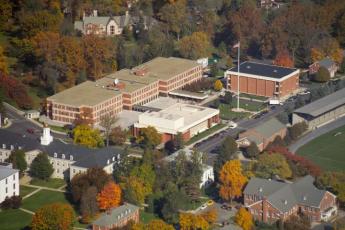 If you have been to Carlisle, PA, you have seen the Army War College, but you may not know much about it.
If you have been to Carlisle, PA, you have seen the Army War College, but you may not know much about it.
Revolutionary Features of Big Data
 New blog 2016-03-20 17:34:08 description
New blog 2016-03-20 17:34:08 description
Admiral of the Ocean Blue
New blog 2018-02-04 03:39:28 description
Bob Gill, M.D.
Bob was the first of several doctors who shared offices with me; our relationship broke up because of an extraordinary investment opportunity he fell into.
A New Definition of Poverty
If we propose to subsidize poverty, we must devise a flexible way to define it.
The Right Angle President's Letter 2018
New blog 2018-12-21 17:02:15 description